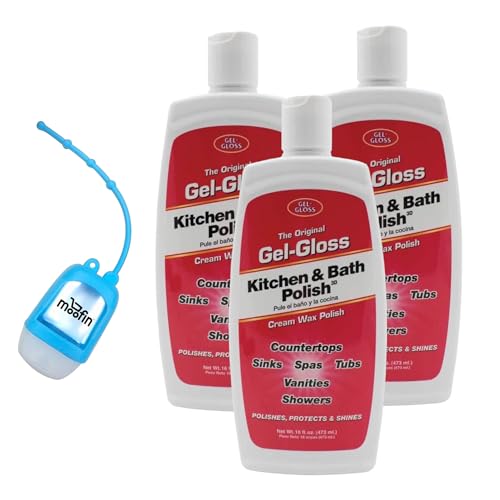


Are you wondering if you can use softened water in your dishwasher? The answer is yes, you can. Softened water can be used in a dishwasher, and it can even provide some benefits in terms of cleaning efficiency and maintenance. However, there are some important considerations and steps to follow in order to use softened water effectively in your dishwasher.
Firstly, it’s important to understand what softened water is and how it works. Softened water is water that has had its hardness minerals, such as calcium and magnesium, removed through a process called ion exchange. This is often done using a water softener, which replaces the hardness minerals with sodium or potassium ions. The resulting soft water is ideal for cleaning as it does not create the same mineral deposits and soap scum that hard water does.
Here’s what you need to do if you have a water softener and want to use softened water in your dishwasher: first, test the hardness of your water to determine if you need a water softener. You can do this using a water hardness test kit, usually available at hardware stores or online. If the test shows that you have hard water, then installing a water softener is recommended.
Using softened water in your dishwasher can help prevent mineral buildup and leave your glassware clear and free from spots. Most dishwasher tabs and all-in-one tablets have ingredients that work best with soft water, so using softened water can enhance their performance. However, if you don’t have a water softener and live in an area with hard water, using these tablets may not be as effective, and you may experience some mineral buildup and cloudiness on your glassware.
It’s worth mentioning that not all dishwasher detergents and products are designed for use with softened water. Some may contain ingredients that can cause excessive foaming or other issues when used with soft water. Always check the packaging for instructions and recommendations on using the product with soft water.
In conclusion, using softened water in a dishwasher can be beneficial if you have hard water in your home. It can help prevent mineral buildup and leave your glassware clear and spot-free. However, it’s important to test the hardness of your water and follow the manufacturer’s instructions when using dishwasher detergents and products with soft water. By doing so, you can ensure that your dishwasher and glassware stay in great condition, and you can enjoy clean and sparkling dishes every time.
Categories:
When it comes to using water softeners in a dishwasher, there are a few different categories to consider:
- All-in-one tablets: These tablets include the necessary ingredients to soften the water and clean the dishes in one convenient package. They can be used in dishwashers without the need for additional water softener.
- Dishwasher salt: If you live in an area with very hard water, using dishwasher salt can help soften the water and prevent the build-up of calcium deposits. This is usually done through a salt compartment in the dishwasher.
- Dishwasher tabs: Similar to all-in-one tablets, dishwasher tabs also contain the necessary ingredients to soften the water and clean the dishes. However, they may not be as effective in hard water areas.
- Using a water softener: If you have a water softener installed in your home, you can use softened water in your dishwasher without the need for additional products. Softened water will already have reduced levels of calcium and other minerals.
It’s important to note that using water softeners in a dishwasher can have an impact on its maintenance and the longevity of certain components:
- Using dishwasher salt or all-in-one tablets can help prevent the build-up of calcium deposits on the heating element and other parts of the dishwasher, prolonging its lifespan.
- Using softened water may not be suitable for washing glassware, as it can create a cloudy appearance. In this case, it’s recommended to use regular tap water for glassware.
- Using dishwasher salt or all-in-one tablets can also help prevent damage to dishes and glassware, as hard water can leave spots and stains.
When using water softeners in your dishwasher, here’s a step-by-step guide to help you get started:
- Check if your dishwasher has a salt compartment. If not, you may need to use dishwasher tabs or all-in-one tablets.
- If you’re using dishwasher salt, pour it into the designated compartment. Be careful not to overfill.
- If you’re using all-in-one tablets, simply place one tablet in the dishwasher’s detergent dispenser.
- If you’re using dishwasher tabs, place one tab in the dispenser and close it. You may also need to put some dishwasher salt in the salt compartment, depending on the hardness of your water.
- Ensure that the dishwasher’s rinse aid compartment is filled.
- Load your dishwasher as usual, making sure not to overcrowd the dishes.
- Select the appropriate cycle for your dishes and start the dishwasher.
By following these steps and using the right water softeners, you can enjoy clean and spotless dishes without the negative effects of hard water.
All-in-one dishwasher tablets and dishwasher salt
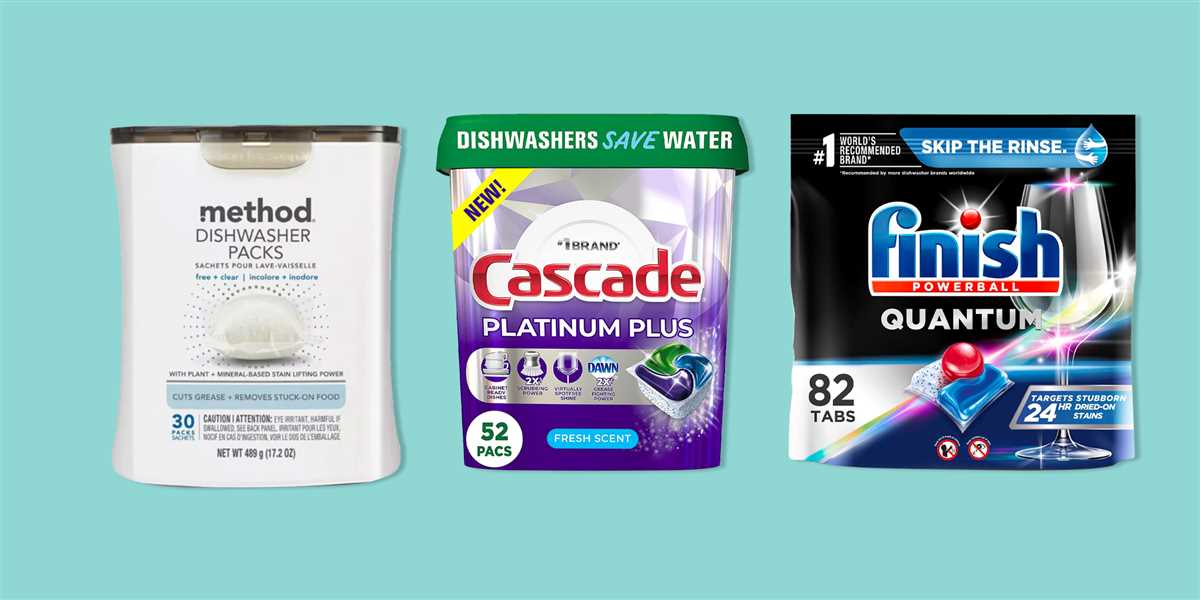
If you live in an area with hard water, you may find that using a dishwasher can be frustrating. Hard water contains high levels of minerals, such as calcium and magnesium, which can cause limescale and leave spots on your dishes and glasses.
One way to soften the water and prevent these issues is by using all-in-one dishwasher tablets and dishwasher salt. All-in-one dishwasher tablets are convenient because they combine multiple functions into one tablet. They contain detergent, rinse aid, and a water softener, which helps to remove limescale and leave your dishes sparkling clean. The all-in-one tablets are usually individually wrapped and dissolve completely in the dishwasher.
Why use dishwasher salt?
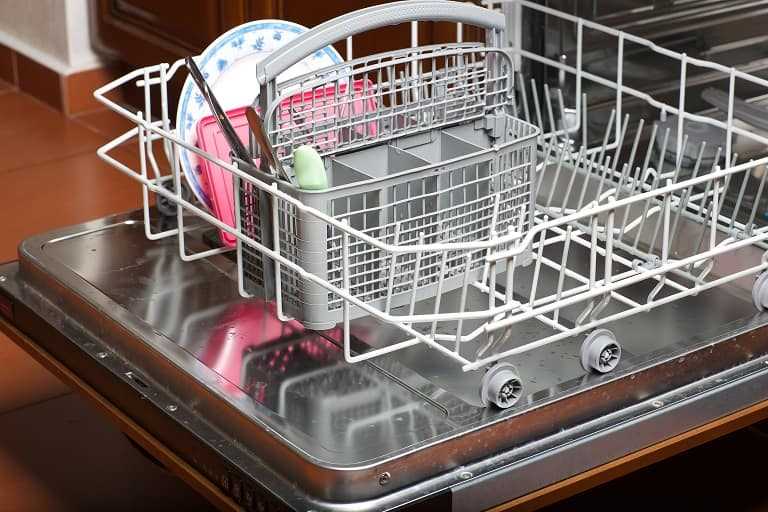
Dishwasher salt is an essential ingredient in the water softening process. It helps to regenerate the ion exchange resin in the water softener, ensuring that the hardness of the water is reduced. This means that the detergent can work more effectively, resulting in cleaner dishes.
If you live in an area with hard water, you will need to regularly test and refill your dishwasher salt. Most dishwashers have a dedicated compartment for the salt, which is usually located at the bottom of the dishwasher. You can easily fill it up by using a funnel to pour the salt into the compartment.
How to use all-in-one dishwasher tablets and dishwasher salt?
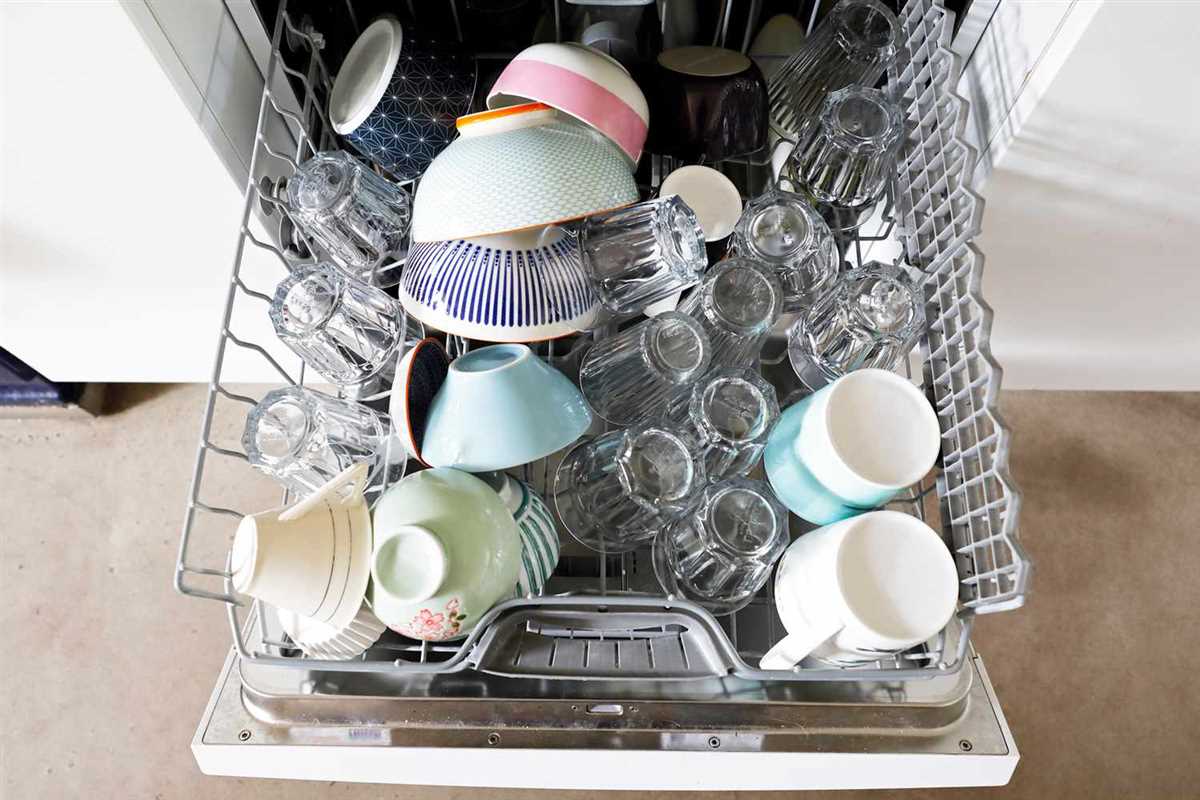
Here’s a step-by-step guide on how to use all-in-one dishwasher tablets and dishwasher salt:
- Check if your dishwasher has a dedicated compartment for dishwasher salt. If it does, make sure it is empty and clean.
- If needed, remove the cap from the salt compartment.
- Using a funnel, pour the dishwasher salt into the salt compartment. Be careful not to overfill it.
- Replace the cap on the salt compartment and make sure it is properly closed.
- Place the all-in-one dishwasher tablet in the detergent dispenser of your dishwasher.
- Close the detergent dispenser and start your dishwasher as usual.
By using all-in-one dishwasher tablets and dishwasher salt, you can enjoy the benefits of soft water without the need for a separate water softener. It helps to keep your dishwasher running smoothly and prevents limescale buildup, which can damage your dishwasher over time.
Remember, it is always important to follow the manufacturer’s instructions and recommendations when using any dishwasher products. If you have any specific questions or concerns, it is best to contact the manufacturer or request guidance from a professional in the field.
Do I Need Dishwasher Salt In Soft Water Area? Here’s Why
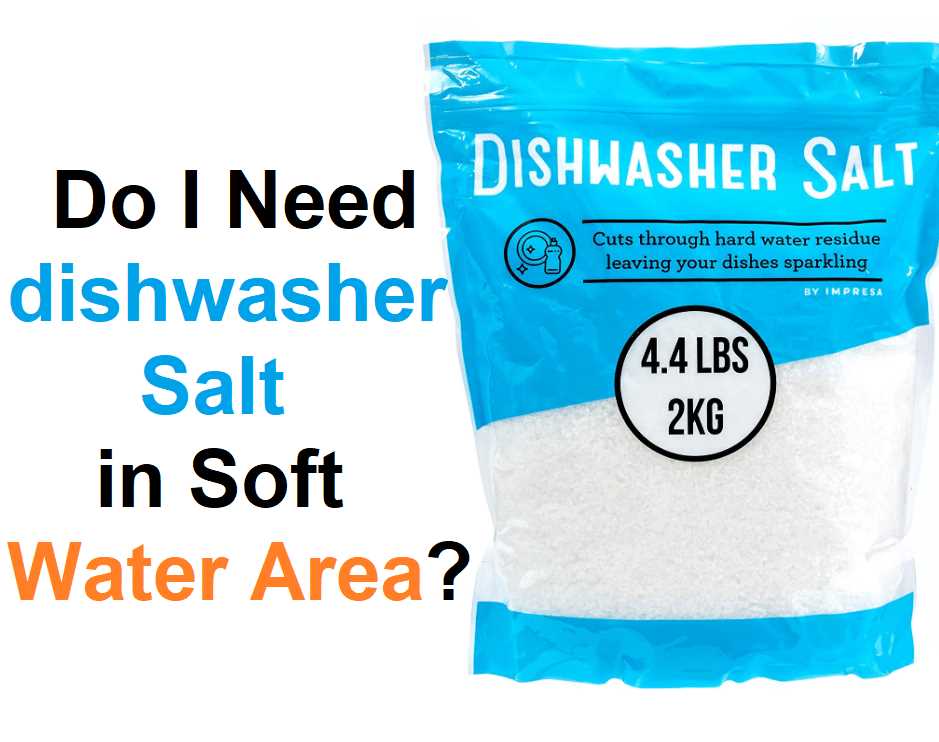
In areas with soft water, you may be wondering if you still need to use dishwasher salt. Let’s explore why using dishwasher salt is important, even in soft water areas.
What is dishwasher salt and why is it needed?
Dishwasher salt, also known as water softener salt or regeneration salt, is a type of salt specifically designed for use in dishwashers. It helps to remove minerals, such as calcium and magnesium, from the water, preventing limescale build-up and improving the overall performance of your dishwasher.
Soft water isn’t always completely free of minerals
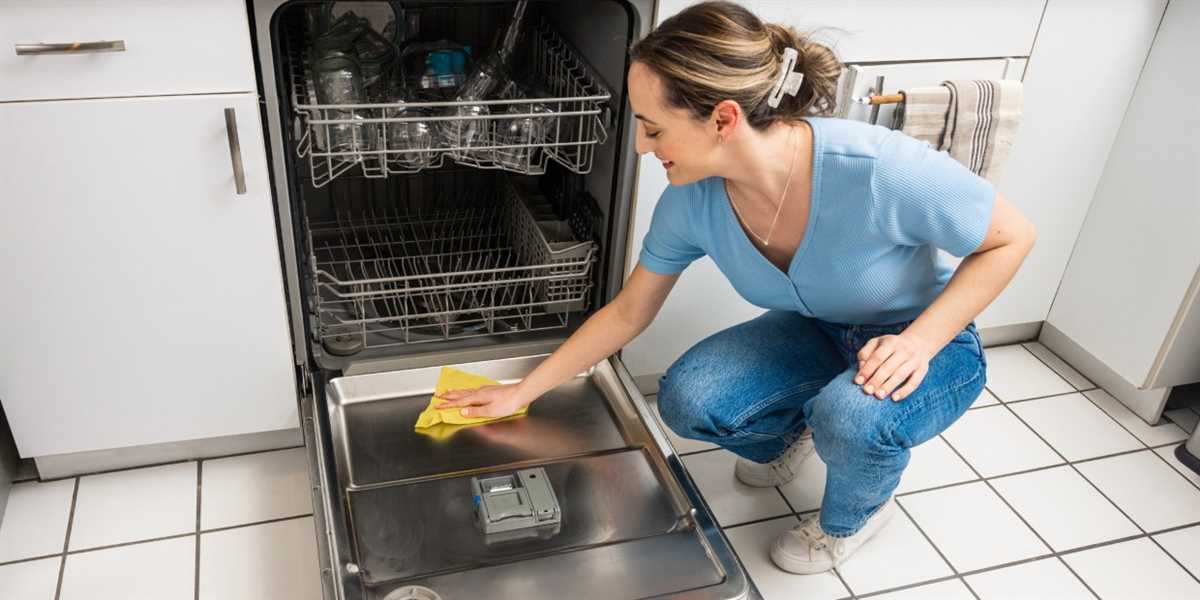
Although soft water has a lower mineral content than hard water, it still contains some minerals. Over time, these minerals can accumulate and lead to limescale build-up in your dishwasher. By using dishwasher salt, you can prevent the formation of limescale and ensure smooth operation of your dishwasher.
Dishwasher salt is particularly important for the maintenance of your dishwasher
Using dishwasher salt not only helps to prevent limescale build-up, but it also helps to protect the internal components of your dishwasher. Limescale can damage heating elements, pumps, and other parts of the dishwasher, potentially leading to costly repairs.
All-in-one dishwasher tablets may not be sufficient
While all-in-one dishwasher tablets usually contain some water softening ingredients, they may not provide enough protection in areas with very hard water. Adding dishwasher salt ensures that the water is properly softened before it enters the dishwasher, resulting in cleaner dishes and better dishwasher performance.
How to add dishwasher salt in soft water areas
If you live in a soft water area and want to use dishwasher salt, here’s how you can do it:
- Check the manual of your dishwasher to ensure it is compatible with dishwasher salt.
- Locate the salt compartment in your dishwasher. It is usually found at the bottom, near the filter.
- Remove the lid of the salt compartment.
- Using a funnel, carefully pour the dishwasher salt into the compartment until it is full. Make sure not to spill any salt in the dishwasher.
- Replace the lid of the salt compartment securely.
Remember to always follow the manufacturer’s instructions for your specific dishwasher model.
Conclusion
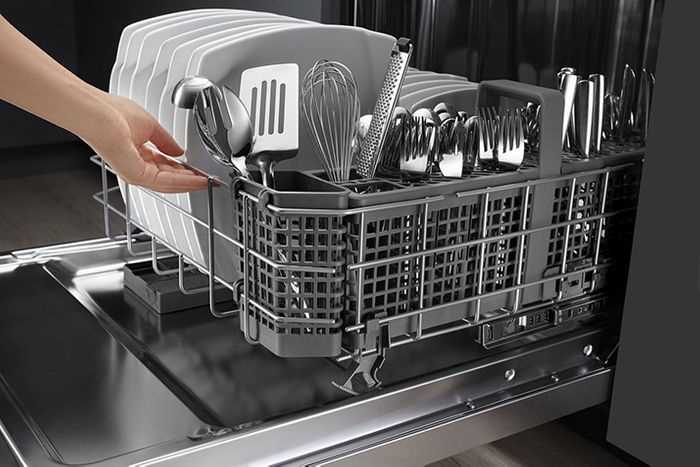
In conclusion, using dishwasher salt is still necessary in soft water areas. It helps to prevent limescale build-up, protects your dishwasher from damage, and improves overall dishwasher performance. By taking this simple step, you can ensure that your dishes come out sparkling clean and your dishwasher stays in top condition.
What If I Don’t Put Salt in a Dishwasher? Will It Get Damaged?
If you own a dishwasher that requires salt, you may wonder what will happen if you don’t put salt in it. Is it really necessary? Will the dishwasher get damaged? Let’s find out.
First, it’s important to understand why dishwashers need salt. Dishwasher salt is used to soften the water that enters the dishwasher. Soft water is low in minerals, especially calcium, which can leave spots and streaks on your dishes, glassware, and silverware. By adding salt, you can prevent the build-up of scale and limescale in the dishwasher, ensuring a spotless and sparkling clean.
So, what happens if you don’t put salt in a dishwasher? Well, it really depends on the hardness of the water in your area. Some areas have very soft water, while others have hard water with high mineral content. If you live in an area with soft water, you may not need to use salt at all. The water in your dishwasher is already soft enough, and using salt may not make a noticeable difference in the cleaning results.
However, if you live in an area with hard water, not using salt in your dishwasher can have some negative effects. Hard water can cause mineral deposits to build up on the heating element and other parts of the dishwasher, leading to reduced efficiency and potentially damaging the appliance over time. The dishes and glassware may also come out cloudy or with spots, defeating the purpose of using a dishwasher.
How to Test Water Hardness
If you’re not sure about the hardness of the water in your area, you can easily test it using a water hardness test kit. These kits are readily available at most home improvement stores or online. Follow the instructions provided with the kit to determine the hardness of your water. This will help you decide whether using dishwasher salt is necessary for your specific situation.
Using Dishwasher Salt
If you determine that your water is hard and using dishwasher salt is recommended, here’s a step-by-step guide on how to add salt to your dishwasher:
- Locate the salt funnel in your dishwasher. It is usually located at the bottom of the dishwasher.
- Open the salt compartment by removing the cap or twisting it counterclockwise.
- Using a funnel, pour the dishwasher salt into the compartment until it is full. Be careful not to overfill.
- Close the salt compartment by replacing the cap or twisting it clockwise.
- Run a maintenance cycle or a regular dishwasher cycle to distribute the salt and ensure it dissolves properly.
By following these steps, you can ensure that your dishwasher functions optimally and delivers sparkling clean dishes and glassware.
No Salt, No Problem
If you don’t want to use dishwasher salt or if it’s not necessary for your water hardness level, you can still achieve good cleaning results by using all-in-one dishwasher tablets. These tablets contain all the necessary ingredients, including salt, to soften the water and clean your dishes effectively.
However, keep in mind that using all-in-one tablets may not be as effective as using dishwasher salt in areas with very hard water. If you notice that your dishes are not getting cleaned properly or you’re experiencing limescale build-up, consider using dishwasher salt to improve your dishwasher’s performance.
To summarize, using salt in a dishwasher is important in areas with hard water to prevent mineral deposits and ensure spotless cleaning results. In areas with soft water, salt may not be necessary. However, if you’re unsure about your water hardness, it’s best to test it and make an informed decision. Always follow the manufacturer’s instructions and recommendations for your specific dishwasher model.
Do I Need Dishwasher Salt If I Use Tablets?
If you use dishwasher tablets, you may be wondering if you still need to use dishwasher salt. The answer to this question depends on the type of tablets you are using and the hardness of the water in your area.
Some dishwasher tablets contain all the necessary ingredients, including water softeners, to effectively clean your dishes. These tablets are designed to work in both soft and hard water areas. So if you live in an area with soft water, you usually don’t need to use dishwasher salt.
However, if you live in an area with hard water, using dishwasher salt can be beneficial. Hard water contains high levels of calcium and magnesium, which can cause limescale buildup and reduce the effectiveness of your dishwasher. By using dishwasher salt, you can help to soften the water and prevent these issues.
Why do you need to soften water?
Softening water is important because it helps to prevent limescale buildup in your dishwasher and on your dishes. Limescale can create a film on your dishes, making them appear cloudy or streaky. It can also damage your dishwasher, leading to costly repairs.
Softened water also helps your dishwasher to work more efficiently. In areas with hard water, the minerals in the water can interfere with the cleaning process and affect the performance of your dishwasher. Using dishwasher salt can help to improve the cleaning power and efficiency of your dishwasher by softening the water.
How to use dishwasher salt with tablets
If you’re using dishwasher tablets and want to add dishwasher salt to your routine, here’s a step-by-step guide:
- Check the water hardness in your area. You can usually find this information on your water bill or by contacting your local water authority.
- If you have hard water, purchase dishwasher salt designed for use with dishwashers. Look for salt specifically labeled for dishwashers, as regular table salt can potentially damage your dishwasher.
- Locate the salt compartment in your dishwasher. This is usually located near the bottom of the dishwasher.
- Using a funnel, carefully pour the dishwasher salt into the salt compartment until it is full.
- Close the salt compartment securely to ensure that no salt spills out during the dishwasher cycle.
- Run your dishwasher as usual.
By following these steps and using dishwasher salt, you can help to prevent limescale buildup, improve the performance of your dishwasher, and extend the lifespan of your appliance.
Why You Need to Use Dishwasher Salt
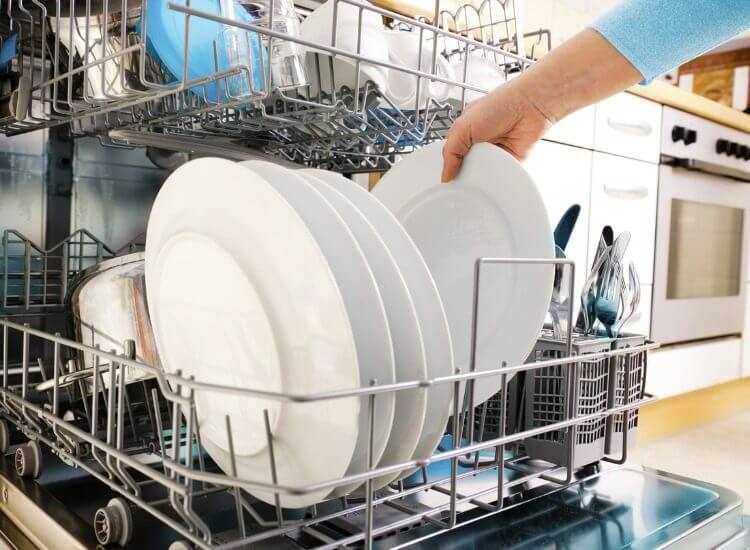
Dishwasher salt is a crucial ingredient in maintaining the performance and longevity of your dishwasher. Using softened water in a dishwasher is common practice, but it’s essential to understand why adding dishwasher salt is necessary for optimal results.
How Does a Water Softener Work?
A water softener is a device that removes minerals, such as calcium and magnesium, from hard water. It works by passing the water through a tank filled with resin beads that attract and trap the mineral ions. This process, known as ion exchange, replaces the hardness minerals with sodium ions, resulting in softened water.
Why Use Dishwasher Salt?
Softened water is beneficial for dishwashing as it prevents limescale buildup, improves detergent performance, and helps to keep your glasses and dishes spot-free. However, there is a need for dishwasher salt in addition to a water softener. The sole purpose of the dishwasher salt is to regenerate the resin beads in the water softener, ensuring that they continue to effectively remove hardness minerals from the water.
How Does Dishwasher Salt Work?
The dishwasher salt works by replenishing the resin beads in the water softener. When you pour the salt into the salt compartment or reservoir in your dishwasher, it creates a brine solution. During the regeneration cycle, this salt solution flushes through the resin tank, replacing the calcium and magnesium ions on the beads with sodium ions. This process rejuvenates the resin beads and allows them to continue removing hardness minerals from the water.
How to Use Dishwasher Salt: Step-by-Step Guide
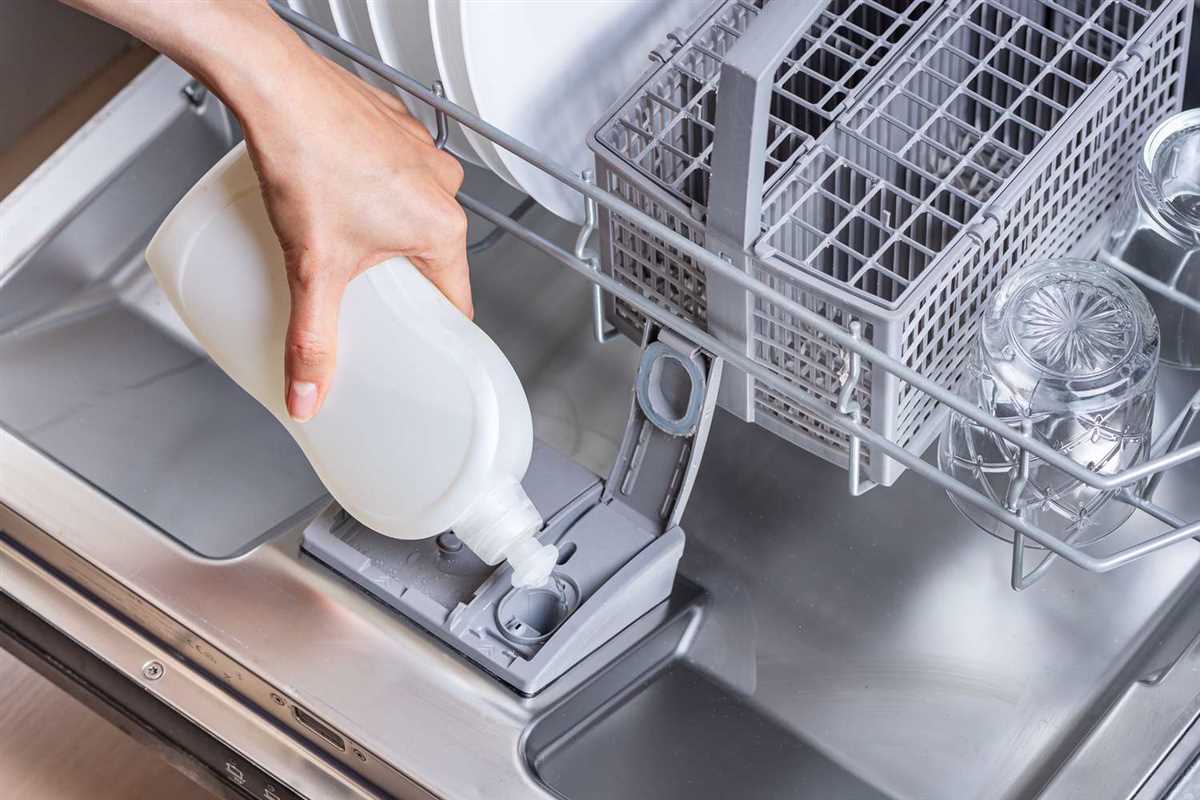
- Ensure that your dishwasher has a salt compartment or reservoir.
- Purchase dishwasher salt specifically designed for use in dishwashers.
- Locate the salt compartment or reservoir in your dishwasher.
- Using a funnel, pour the dishwasher salt into the designated area.
- Be careful not to overfill the compartment or reservoir.
- Close the compartment or reservoir securely.
- Your dishwasher is now ready to use with softened water and dishwasher salt.
Note: If you live in an area with extremely hard water, you may need to check the salt level more frequently and add salt as needed. There are also dishwasher salt test tablets available for personal use to determine if your dishwasher requires more salt.
Benefits of Using Dishwasher Salt
- Prevents limescale buildup in the dishwasher and on dishes.
- Improves the effectiveness of detergent and rinse aid.
- Keeps glassware and dishes spot-free and shiny.
- Extends the lifespan of your dishwasher.
- Reduces the need for maintenance and repairs.
In conclusion, using dishwasher salt in conjunction with a water softener is crucial for maintaining optimal performance and longevity of your dishwasher. It helps prevent limescale buildup, improving detergent effectiveness and keeping your dishes and glassware in top condition. By following the step-by-step guide, you can ensure that you are using dishwasher salt correctly and reaping its many benefits.
Step-by-step Using Dishwasher Salt
Using dishwasher salt in your dishwasher is essential to maintain its performance and prevent damage. Here’s a step-by-step guide on how to use dishwasher salt effectively:
- First, check if your dishwasher has a compartment for dishwasher salt. This compartment is usually located at the bottom of the dishwasher.
- If the compartment is damaged or you don’t have one, check the dishwasher manual to see if there is a specific area where you can put the salt. Some dishwashers don’t have a compartment and require the salt to be added directly to the water.
- If your dishwasher has a compartment, open it and pour the dishwasher salt into the funnel. Be careful not to overfill it.
- Close the compartment and make sure it is securely locked to prevent any leaks.
- Run a test cycle to ensure that the dishwasher salt is distributed properly and is working effectively.
- If your dishwasher doesn’t have a compartment for salt, you will need to add the dishwasher salt to the water manually. Follow the instructions in your dishwasher manual to know the exact amount of salt required.
- Using a funnel, pour the required amount of dishwasher salt into the water in your dishwasher.
- Make sure to distribute the salt evenly in the water to ensure proper softening.
- Run a test cycle to check if the salt has softened the water effectively.
Using dishwasher salt helps to soften the water by removing hardness minerals like calcium. Soft water is essential for efficient cleaning and prevents lime scale buildup on your dishware and dishwasher. By using dishwasher salt, you can enjoy clean and spotless dishes without any damage.
Remember, if you live in an area with very hard water, using dishwasher salt is a must for optimal dishwasher performance. Don’t worry if you don’t have a compartment for salt in your dishwasher; many dishwashers allow manual addition of salt. Just make sure to follow the instructions provided in your dishwasher manual or reach out to the manufacturer for personalised tips.
FAQ
Can I use softened water in a dishwasher?
Yes, you can use softened water in a dishwasher. Softened water can effectively clean your dishes, but it may not provide the same level of cleaning power as hard water. It’s also worth noting that using very soft water in a dishwasher may require adjustments to the amount of detergent and rinse aid used.
Do I need dishwasher salt in a soft water area?
No, you don’t necessarily need dishwasher salt in a soft water area. Soft water doesn’t require the use of dishwasher salt because it doesn’t contain high levels of minerals that can cause limescale buildup. However, using dishwasher salt can still enhance the performance and longevity of your dishwasher and improve the cleanliness of your dishes.
What if I don’t put salt in a dishwasher? Will it get damaged?
If you don’t put salt in a dishwasher, it won’t directly cause damage to the dishwasher itself. However, using dishwasher salt helps to prevent limescale buildup and prolong the lifespan of the dishwasher. Without salt, limescale can accumulate over time, reducing the efficiency of the dishwasher and potentially leading to problems with its components.
Why do I need to use dishwasher salt?
You need to use dishwasher salt because it helps to soften the water used in the dishwasher. Softened water reduces the risk of limescale buildup on dishes, glassware, and the dishwasher itself. It also helps to improve cleaning performance by enhancing the effectiveness of detergent and rinse aid. Using dishwasher salt can prolong the lifespan of your dishwasher and keep your dishes sparkling clean.
Do I need dishwasher salt if I use tablets?
If you use all-in-one dishwasher tablets that already contain salt, you may not need to add extra dishwasher salt. These tablets usually have built-in water softeners, which can help prevent limescale buildup. However, it’s always a good idea to check the instructions on the tablet packaging or consult the manufacturer to ensure you are using the product correctly.







